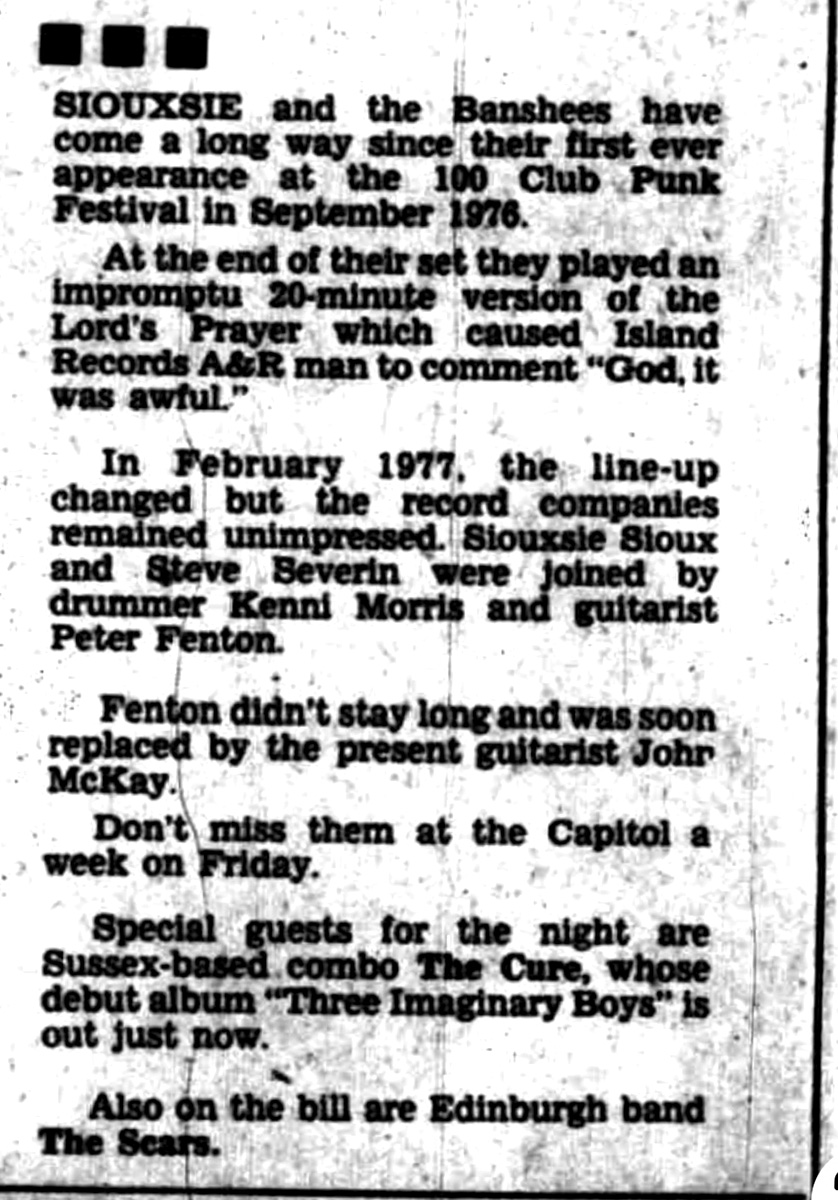1979-09-07 Aberdeen - Capitol Theatre (Scotland)
Mainset:
10.15 Saturday NightAccuracy
Grinding Halt
Play For Today
Subway Song
Foxy Lady
Plastic Passion
Three Imaginary Boys
Boys Don't Cry
Fire In Cairo
Killing An Arab
Encore 1:
Seventeen SecondsM
The Lord's Prayer
'The Lord's Prayer' is a 'Siouxsie and the Banshees' song
Robert Smith
Laurence Tolhurst
Michael Dempsey
Laurence Tolhurst
Michael Dempsey
Guests:
Siouxsie Sioux and Steven Severin on 'The Lord's Prayer'
Songs played: 14 (11 | 3)
Day of the week: Friday
Tour: 'Join Hands Tour' (Siouxsie and the Banshees)
Attendance:
Capacity:
Day of the week: Friday
Tour: 'Join Hands Tour' (Siouxsie and the Banshees)
Attendance:
Capacity:
- This was the first ever The Cure concert in Scotland.
No ticket available yet.
Submit your tickets and adverts, stories, photos, recordings and more to
Submit your tickets and adverts, stories, photos, recordings and more to
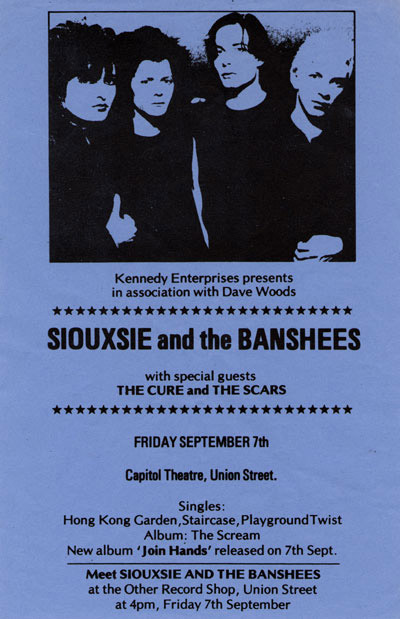 thanks to afoolisharrangement.com
thanks to afoolisharrangement.com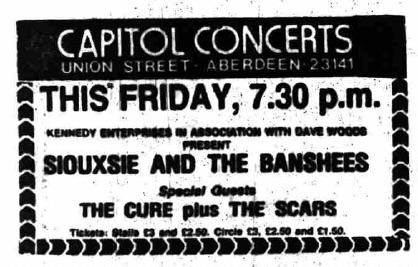 thanks to JC Moglia
thanks to JC Moglia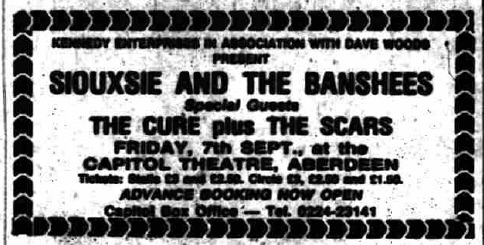 thanks to JC Moglia
thanks to JC Moglia thanks to Petr H.
thanks to Petr H.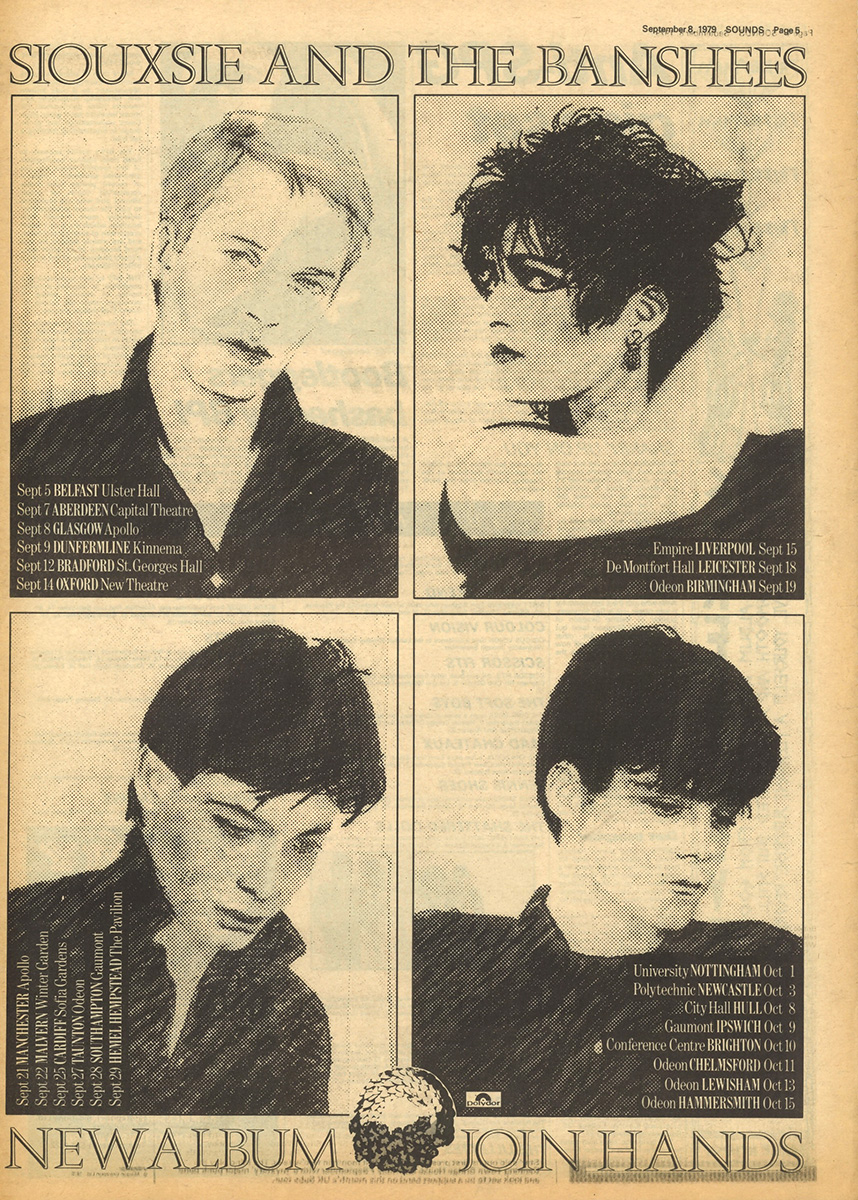 thanks to Petr H.
thanks to Petr H.
Article links:
from the book 'Ten Imaginary Years'
The next date of the tour was in Aberdeen and everyone arrived off the ferry to discover massive policing because Maggie Thatcher was in town. The traumas continued that night when, after a frosty public appearance at a record store, Kenny Morris and John McKay, The Banshees' drummer and guitarist, pinned their tour passes on their pillows, took a train to London and quit the band. This didn't exactly come as a shock to The Cure.Robert: "I remember after a warm up date in Bournemouth, we'd finished our set and we were sitting backstage and Severin and Sioux came in an chatted to us, just getting to know us, but Morris and McKay wouldn't say anything. If we bumped into them, and said hello, they'd just turn their heads away like superstars!
The first we really knew about them leaving was, the pandemonium backstage at the concert. Dave Woods, The Banshees' manager, was in a panic as we came off from playing our set and asked us if we could go back on and play some more. I said okay and Sioux and Severin went on and made the announcement. The crowd started chanting and we went back on and played some unfinished new songs like '17 Seconds', ones that we'd written the music to but not the words. I think we did 'M' and then they joined us for 'The Lord's Prayer'. Severin was shouting to me 'E! Just play E!' and, as it turned out. that wasn't to be the last time he shouted it at me either!
I thought it was a good night. We went back to The Banshees' hotel afterwards and I ended up staying there with Sioux and Severin getting drunk together for the first time. They were discussing what they were going to do and I wanted the tour to go on. It was important to us so I just suggested that I'd play with them if they needed me. Severin told me they'd audition some guitarists and it was left at that."
'from 'A Visual Documentary'
In Aberdeen, the Banshees are ripped apart when drummer Kenny Morris and guitarist John McKay quit with no warning, hours before the band are due to take the stage. The problem arose after the band trooped down to a local record store, where they were due to make an appearance, signing copies of their latest album, 'Join Hands'. Unfortunately Polydor, the band's record label, had seriously under-estimated the support the band could command in the area - the shop ordered 200 copies of the album, Polydor delivered just 50, all of which were sold within moments of the band walking into the shop. Fortunately the Banshees manager, Nils, had a pile of albums in the back of his car. He sold them to the shop owner, but Morris and McKay took it upon themselves to then start handing the albums out for free. When the shop owner remonstrated with them, the pair announced they wouldn't sign any more autographs. Siouxsie and Severin tried to restore order, but an argument developed and Morris and McKay stormed out. By the time the rest of the entourage returned to the hotel, the pair were already on a train back to London, their tour passes pinned to their pillows.That night, The Cure's set is extended after the remaining Banshees, Siouxsie and Severin, have explained the situation to the crowd, and the show ended with the pair joining The Cure onstage for a version of the headliners' show-stopper, 'The Lord's Prayer'.
After the show, Robert offers to take over guitar duties in the Banshees, besides playing with The Cure, for the duration of the tour. In the meantime, shows at Glasgow Apollo (September 8), Dunfermline Kinnema (September 9), Bradford St.Georges Hall (September 12), Oxford New Theatre (September 14) are cancelled.
from theguardian.com
Punters at the Banshees' concert at the Capitol theatre, Aberdeen on the evening of 7 September 1979 were met with an astonishing announcement from the singer. "Two art-school students fucked off out of it," she began. "You have my blessings to beat the shit out of them." Siouxsie's fury and a plethora of "Banshees quit" stories were triggered after guitarist and key figure John McKay and drummer Kenny Morris exited the band in the middle of a tour, grumbling about how the band's "original ideals" had given way to the usual album-tour schedule.

Support | The Scars
Support | The Cure
Headliner | Siouxsie and the Banshees
Support | The Cure
Headliner | Siouxsie and the Banshees
Siouxsie and the Banshees did not perform because two members left the band a few hours before the show.
Venue address:
431 Union StAberdeen AB11 6DA
Venue related links:
Venue trivia:
- It was a cinema on Union St, and is now the Chicago Rock Cafe. It had an amazing old Wurlitzer (I think) cinema organ, and I remember seeing a guy coming up from below stage while playing it. Heaps of great bands have played there over the decades. Among the bands I've seen there were the Rolling Stones, the Cure, Siouxsie & the Banshees, the Buzzcocks, Chuck Berry, Bo Diddley, the Kinks, Jethro Tull, Everly Bros, Van Morrison, Elvis Costello, Paul McCartney, the Smiths and Talking Heads. I've missed out tons of equally big names.
The Cure appearances at this venue:




